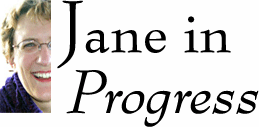 |
|
 |
 |
Looking for tips and tricks to the art of writing for television? Welcome to the blog of experienced television writer Jane Espenson. Check it out regularly to learn about spec scripts, writing dos and don'ts, and what Jane had for lunch! (RSS:  ) |
|
|
Home » Archives » July 2007 » Holding the Reader's Hand
[Previous entry: "Why No Murphy Brown? Did I Really Not Have a Murphy Brown?"] [Next entry: "Setting the Setting on your Scene Setting"]
07/08/2007: Holding the Reader's Hand
We all know how important act breaks are, right? The dramatic moments at the end of acts are not just there as little tricks to make the audience return after the commercials, they legitimately turn the story in a new direction.
When you're writing an act break, don't just think about the last action that happens, or the last line of dialogue. Think hard about the last words that appear on the script page right before "END OF ACT WHATEVER." You should use these words to help the reader know exactly where they're supposed to be mentally, what they're supposed to focus on.
For example, let's imagine that a character has just swept out of the room, leaving another character there alone. You could just say that, start typing "END OF...," and trust that any attentive reader will know all that is implied by that action. Or, you can nail it down with something like:
Harriet stares after John, hoping his anger isn't about to get them both into deeper trouble.
Sure, an attentive reader knows that's what she's hoping, but you never can be sure exactly how attentive your reader is. A little check-in sentence like this makes sure everyone is following along.
It also has a novelistic feel, telegraphing what's about to happen in a way that prose writers get to do a lot, but that's more limited in the stripped-down world of script-writing.
Be careful not to try to sneak stuff into this sentence that a reader couldn't actually know, of course, but if this is done right it can be very helpful in letting a reader know they're reacting as you intend them to react.
Lunch: some kind of scramble at a Canadian Denny's. It was something like the "Homestead Scramble" or the "Heartland Scramble." Nine letters, started with 'h' and ended with pancakes.
|
|
|
 |
|
Get Blog Updates Via Email
|
|
 |

